Introduction
In the rapidly evolving landscape of private investigations, technological advancements have become indispensable tools for enhancing the efficiency and effectiveness of investigative processes. Private investigative agencies now leverage a wide array of cutting-edge technologies to streamline their operations, gather crucial information, and ensure successful outcomes. This article explores some of the best technologies available to private investigative agencies, including artificial intelligence (AI), witness statement software, research resources, and Technical Surveillance Counter-Measures (TSCM).
Artificial Intelligence (AI)
AI has revolutionized the field of private investigations, providing investigators with powerful tools to process and analyze vast amounts of data. The applications of AI in private investigative work are diverse and impactful.
- Predictive Analytics: AI algorithms can analyze historical data to identify patterns and predict future events. In investigations, this can help anticipate potential risks, enabling agencies to take proactive measures.
- Facial Recognition: Facial recognition technology allows investigators to match faces against databases, aiding in identifying individuals in surveillance footage or public spaces.
- Natural Language Processing (NLP): NLP helps process and understand human language, making it useful for analyzing written or spoken content. Private investigators can use NLP to sift through large volumes of text data for relevant information.
- Social Media Monitoring: AI-driven tools can monitor social media platforms for relevant information, providing investigators with real-time updates on a subject’s activities, associations, and locations.
Witness Statement Software
Collecting accurate and detailed witness statements is a critical aspect of private investigations. Witness statement software streamlines this process, ensuring consistency and reliability in the information gathered.
- Digital Audio and Video Recording: Modern software allows investigators to record witness statements digitally, preserving audio and video evidence for analysis. This technology enhances the accuracy of statements and provides a secure means of documentation.
- Time-Stamped Statements: Witness statement software often includes features such as time-stamping, helping investigators create a chronological record of events as described by witnesses. This can be crucial in building a timeline for an investigation.
- Cloud-Based Storage: Secure cloud-based storage ensures that witness statements are safely stored, easily accessible, and can be shared among team members, promoting collaboration and coordination.
Research Resources
Access to comprehensive and reliable research resources is paramount for private investigators. Leveraging digital platforms and databases enhances the depth and accuracy of investigations.
- Public Records Databases: Private investigators use online databases to access public records such as court records, property records, and business registrations. This information can provide valuable insights into a subject’s history and activities.
- Deep Web and Dark Web Monitoring: Investigative agencies employ tools to monitor both the deep web and dark web for relevant information that might not be accessible through conventional search engines. This allows investigators to uncover hidden details and potential leads.
- Open Source Intelligence (OSINT): OSINT tools gather information from publicly available sources, aiding investigators in assembling a comprehensive profile of their subjects. This can include social media activity, online publications, and other publicly accessible data.
Technical Surveillance Counter-Measures (TSCM)
As technology advances, so does the risk of electronic surveillance. TSCM, also known as electronic countermeasures or bug sweeping, is the process of detecting and neutralizing electronic surveillance devices.
- RF Spectrum Analysis: TSCM experts use RF spectrum analyzers to detect radio frequency signals emitted by surveillance devices. This technology helps investigators identify and locate hidden transmitters.
- Non-Linear Junction Detection (NLJD): NLJD devices identify electronic components that may be part of covert listening devices or hidden cameras. This tool is invaluable for uncovering concealed surveillance equipment.
- Infrared Detection: TSCM experts use infrared detection equipment to identify the presence of infrared cameras or other devices that may be used for covert surveillance.
Conclusion
The technological landscape for private investigative agencies is continually evolving, and staying abreast of these advancements is crucial for maintaining a competitive edge. Artificial intelligence, witness statement software, research resources, and TSCM are just a few examples of the cutting-edge technologies transforming the investigative field.
As private investigative agencies integrate these technologies into their operations, they gain the ability to process vast amounts of data efficiently, conduct thorough research, and ensure the security of their investigations. The synergy between human expertise and technological tools is proving to be a formidable force, enabling investigators to navigate complex cases with precision and efficacy.





